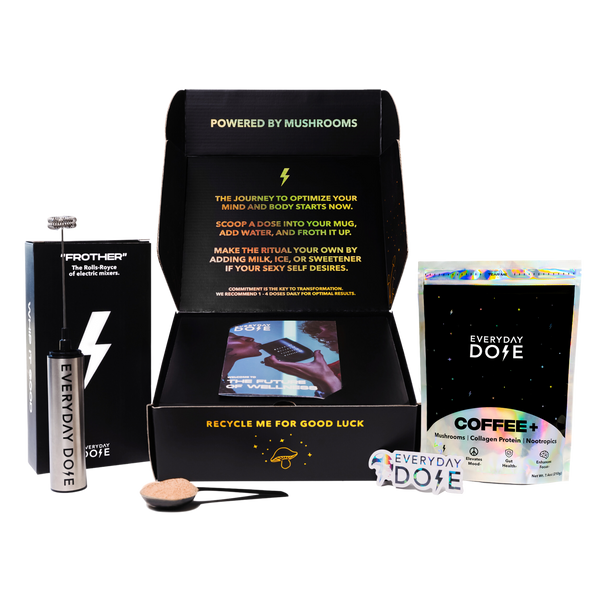Coffee and Candida: Does It Help?

For many of us, coffee feels a lot like medicine — especially on Monday mornings. This is especially true if you drink functional coffee with extra health benefits.
Sometimes, the benefits of coffee can be big enough that you consider it more of a supplement than a wake-up call. But do the benefits of coffee extend to health concerns like Candida overgrowth? Read on to learn more about the relationship between coffee and Candida.
What Is Candida Overgrowth?
Candida is actually a type of yeast that lives in your body. In small amounts, it’s harmless and even helpful. But when Candida goes rogue, it can quickly take over your gut.
Candida overgrowth can be triggered by high-sugar diets, antibiotics, stress, or a weakened immune system. This imbalance can disrupt your gut health, which can obviously affect many other areas of your health, too.
What Are the Symptoms of Candida Overgrowth?
The only way to truly know if you’re dealing with Candida overgrowth is to run some lab tests. However, going by symptoms can help you narrow down possible causes of your discomfort and help you communicate your concerns to a healthcare provider.
Symptoms of Candida include the following:
- Fatigue that coffee can’t fix
- Stubborn digestive issues
- Recurring yeast infections
- Brain fog
- Cravings for sugar and carbs
- Skin problems like rashes or acne
Of course, these symptoms can also be attributed to many other conditions. For instance, brain fog is often a sign of thyroid disorders, while digestive issues can be due to conditions like IBS. Talking to a doctor is the first step to knowing exactly what you’re dealing with and how to treat it.
How Can Coffee Affect Candida?
When it comes to Candida, one of the first steps is to make some changes to your diet. If you’re already at this point, you might be wondering if you can still drink your favorite cup of joe while banishing the unwanted yeast. However, that might not be a good idea — read on to learn more about how coffee and Candida interact.
Spikes Blood Sugar
Caffeine can cause blood sugar levels to spike by temporarily increasing insulin resistance. When insulin struggles to shuttle sugar into cells, glucose lingers in your bloodstream.
Candida thrives in a high-sugar environment, using it as fuel to multiply. Add sugary creamers or syrups to your coffee, and you’re basically giving Candida an all-you-can-eat buffet.
While coffee itself isn’t inherently bad, those blood sugar swings can create the perfect storm for Candida overgrowth, especially if you’re predisposed to it. You could probably still get away with a cup of coffee after breakfast, but make sure it’s sugar-free and low in caffeine.
Lowers the Immune System
Caffeine may be your go-to morning pick-me-up, but too much of it can stress out your immune system. High caffeine consumption triggers the release of stress hormones like cortisol, putting your body in "fight or flight" mode.
This can weaken your immune response, giving opportunistic invaders like Candida the environment they need to overgrow. Additionally, chronic caffeine intake can disrupt your sleep, which plays a key role in maintaining a strong immune system. While that morning cup isn’t a bad thing on its own, drinking multiple cups a day could make it harder for your body to keep Candida in check.
Unconfirmed Benefits
Some studies suggest that caffeine may have antifungal properties against Candida albicans (the most common strain of Candida) in lab settings. The antioxidants in coffee may also support your body’s immune defenses.
However, these studies use highly concentrated caffeine doses — far more than your morning brew provides. In practical terms, you’d need to drink a bathtub’s worth of coffee to see similar results, which is, let’s face it, impractical (and not healthy — just think of the jitters!).
Basically, there’s some research that suggests caffeine could both help with and exacerbate Candida overgrowth. So, moderation is key here — don’t overdo it on the caffeine, and you should be right as rain.
Is Decaf Coffee Better for Candida?
Because of the uncertain effects of caffeine on Candida, decaf or low-caf coffee might be a safer option. Because they contain significantly less caffeine, they don’t carry the same risk of immune suppression and blood sugar spikes that regular coffee might trigger. Plus, both options still contain antioxidants, which can help support your overall health.
However, not all decaf is created equal — choose a high-quality brand that avoids chemical processing. Keep in mind that even decaf has a tiny amount of caffeine, which may still affect those who are extra sensitive to caffeine.
Don’t have a low-caf coffee at home? Look no further than our Mushroom Coffee+. This coffee is made with only 45 mg of caffeine per serving, but it still has the robust flavor of a gourmet cup of coffee. Plus, our blend also features lion’s mane mushroom for gut health, chaga mushroom for immunity, L-theanine for sleep, and collagen for skin and hair health.
How Else Can You Help With Candida Overgrowth?
Managing Candida is about more than just being mindful of your caffeine intake — it involves a slew of diet and lifestyle changes. Some strategies that can help with Candida include the following:
- Cut Back on Sugar and Refined Carbs: These are Candida’s favorite foods. By reducing sugar and simple carbs in your diet, you starve the yeast and limit its ability to grow and thrive.
- Focus on Whole Foods: Vegetables, lean proteins, and healthy fats help support a balanced diet while keeping blood sugar levels stable, which Candida hates.
- Incorporate Fermented Foods: Options like kimchi, sauerkraut, and kefir introduce probiotics that replenish good bacteria in your gut, creating an environment less hospitable to Candida.
- Take Probiotics: A high-quality probiotic supplement can help restore balance to your gut microbiome, giving the good bacteria the upper hand.
- Stay Hydrated: Drinking plenty of water helps flush toxins from your system and support your body’s natural detoxification processes.
- Reduce Stress: Chronic stress weakens your immune system and elevates cortisol, both of which can encourage Candida growth. Practice stress-relieving activities like yoga, meditation, or daily walks.
- Prioritize Sleep: A well-rested body is better equipped to fight off infections, including Candida. Aim for at least seven to nine hours of quality sleep each night.
The Bottom Line
Candida overgrowth can be frustrating, but with the right approach, it’s manageable and even beatable. While coffee’s place in this battle is somewhat unclear, it’s generally a good idea to just be mindful of your intake and cut back if you notice your symptoms worsening.
Just because coffee isn’t proven to help Candida doesn’t mean it can’t help with other things — especially if your coffee is packed with superfoods like our Mushroom Coffee+. Try it for yourself today, and don’t forget to visit our blog to learn all about the benefits of mushrooms.
Sources:
Candida Albicans: Infections, Symptoms & Treatments | Cleveland Clinic
Candidiasis Information | Mount Sinai - New York
Effects of Coffee Consumption on Insulin Resistance and Sensitivity: A Meta-Analysis | PMC








